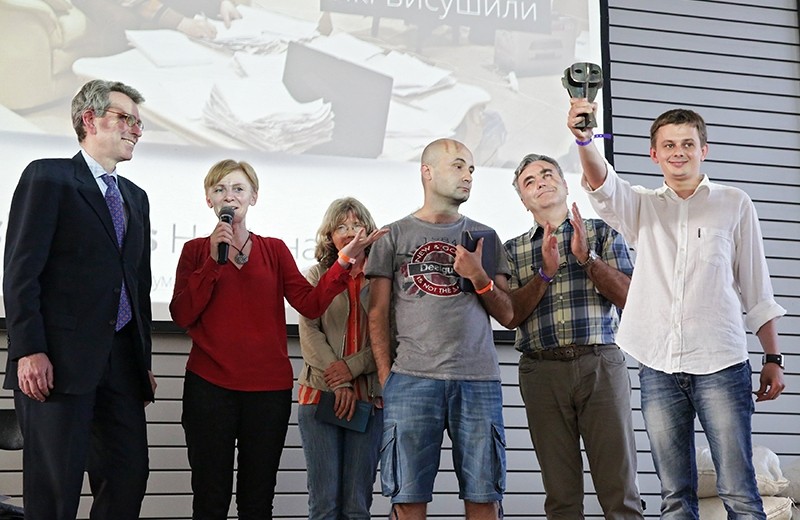There were plenty of other professional awards. There has even been an award for young and aspiring journalist investigators, run by Ukrainska Pravda with the support of the U.S. Embassy for the past three years.
But there was no Ukrainian Pulitzer Prize. A group of journalists from YanukovychLeaks project decided to change this, with the backing of the Danish-funded SCOOP, a network for investigative journalists in Eastern Europe, Russia, Caucasus, Central Asia and West Africa.
The award is extremely timely. At a time of revolution and war, journalistic investigations rarely take place. This is why it was especially important for us, the organizers, to honor those who set aside the daily news items to dive below the surface.
Also, this year we organized an international festival for investigative journalists in Mezhyhirya, the massive 140-hectare estate stolen from the state by overthrown President Viktor Yanukovych. It returned to its rightful state owners – following a billion-dollar renovation – after Yanukovych fled in Feb. 22 and located to Russia, where he is hiding from mass murder and other criminal charges back home.
The three-day event – organized with help from the Media Development Foundation, a non-profit organization started by Kyiv Post journalists – started on June 6. This is Journalism Day, a professional holiday in Ukraine. In the previous three years, journalists traveled on this date to the gate of Mezhyhirya to picket the sitting president, but could not get past the five-meter fence and heavy security around the perimeter.
After Yanukovych fled, leaving behind plenty of incriminating evidence of massive corruption, a team of journalists – now known as YanukovychLeaks – worked at the abandoned presidential residence recover and preserve documents that had been dumped into the Dnipro River’s Kyiv Sea.
So it seemed fitting to reclaim the territory for an investigative journalism conference this summer. We hope to make it an annual event. One of the reasons is to ensure that the public has access to the posh estate, and that new government officials are not tempted to move into it.
We announced a competition for investigations that came out between Dec. 1, 2013 and May 15, 2014. We accepted Internet publications, newspaper and video reports related to the protests in Kyiv, Russia’s annexation of Crimea and the war in eastern Ukraine, relations with Russia, as well as the fate of Yanukovych and his close circle.
Members of YanukovychLeaks, who are all investigative journalists, were excluded from the competition this year to avoid any conflict of interest. But even with all these limitations, we received 12 investigations – some of them quite brilliant.
The competition was judged by a panel of five journalists: Vlad Lavrov (Kyiv Post/Organized Crime and Corruption Reporting Project), Katya Gorchinskaya (Kyiv Post/OCCRP/Wall Street Journal), Anna Babinets (Slidtsvo.info/YanukovychLeaks), Oleg Khomenok (SCOOP) and Matthew Kaminski (Wall Street Journal).
The happy winner of the first award was Lyubomyr Ferens, a 33-year-old journalist from TVi channel, for his 10-minute documentary “How Nigoyan, Zhyznievskiy and Senyk were murdered.”
The film was a successful attempt to show that the trio of first victims from the EuroMaidan Revolution was shot on Jan. 22 from pneumatic weapons with use of live ammunition, despite police claims that only rubber bullets were used against demonstrators.
Ferens said digging out the truth was difficult because he had to talk to hundreds of people of Maidan to find witnesses. “I came down with a 40-degree fever when I finished my report,” he recalled.
This inaugural award is the first baby step on a long road. We want to turn this award into an institution and have agreed to a joint effort with Ukrainska Pravda, which has been a trusted source of journalism in Ukraine since 2000. We also have a pledge from the U.S. Embassy in Ukraine for some form of assistance, but this is yet to be negotiated.
We want our award to become a self-supporting institution, run by rotating teams of journalists and activist volunteers who are motivated by ideals and not money.
On top of having a great competition, we wanted to make sure to have a cool trophy as a symbol. We didn’t want a boring Pulitzer-style medal. We wanted our trophy to be instantly recognizable, like an Oscar statue, but meaningful at the same time.
We think we succeeded with the help of Vasyl Tatarenko, a talanted Ukrainian sculptor and artist. He created a modern bronze sculptur for us with a man with several faces. We love it for its symbolism of removing masks – a perfect allegory for investigative journalism, and have nicknamed it The Proxy, as in proxy directors, shareholders and firms set up to hide real beneficiaries of cash flows.
This year’s trophy and a cash prize of 1,000 euros to the winner were sponsored by SCOOP, a Danish foundation for investigative journalism. SCOOP has also paid for the trophies for the next two years, and committed to sponsoring the monetary award for the winners in 2015-16.
Kyiv Post deputy chief editor Katya Gorchinskaya can reached at gorchinskaya@kyivpost.com and staff writer Vlad Lavrov at lavrov@kyivpost.com.



